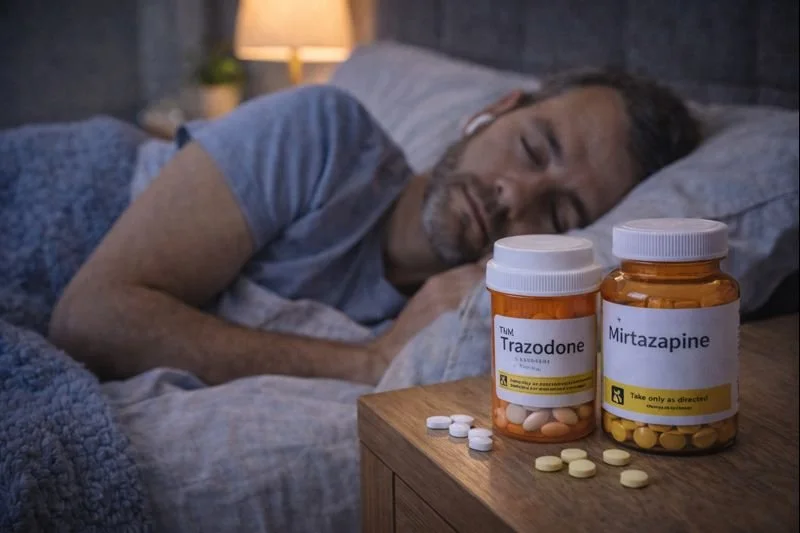Can Psychiatric Medications Help with Insomnia? Here's What Works
Struggling with Sleepless Nights? You're Not Alone
Insomnia is one of the most common complaints we hear from patients at Dignity Brain Health. If you're lying awake at night, unable to fall asleep or waking up too early, you're not alone—and you’re not without options.
Many people search for ways to improve their sleep, and some wonder whether psychiatric medications can help. The answer is yes—but it depends on the cause, your medical history, and finding the right treatment plan.
In this article, we'll walk you through how psychiatric medication management can help with insomnia, what medications are most often used, what to expect, and how our tele-psychiatry services in Massachusetts can support you.
How Does Psychiatry Approach Insomnia?
Psychiatric clinicians look beyond just short-term sleep aids. We aim to understand and treat underlying causes, whether it's anxiety, depression, ADHD, or other conditions.
About 50–70 million adults in the U.S. experience sleep disorders, and nearly 90% of individuals with depression report poor sleep quality (Baglioni et al., 2011).
That’s why treating insomnia often involves a whole-person, psychiatric medication management approach rather than just prescribing sleeping pills.
Medications That Help With Insomnia
Depending on your symptoms and diagnosis, several psychiatric medications may help improve your sleep. These may be used short-term or long-term depending on the underlying issue.
SSRIs and SNRIs for Anxiety or Depression-Related Insomnia
When insomnia is rooted in depression or anxiety, addressing the root cause can significantly improve sleep.
SSRIs (e.g., Lexapro, Zoloft, Prozac)
SNRIs (e.g., Effexor, Cymbalta)
These medications regulate serotonin and/or norepinephrine, improving mood and helping the body return to a more stable sleep-wake cycle.
🧪 A meta-analysis found SSRIs significantly improved sleep in patients with comorbid depression and insomnia, particularly after several weeks of treatment (Zhou et al., 2020).
Sedating Antidepressants
Some antidepressants have sedative effects and can be helpful for individuals with insomnia even if they don’t meet full criteria for depression.
Trazodone: Commonly prescribed at low doses for sleep support
Mirtazapine (Remeron): Often used for patients with both insomnia and appetite loss
🧪 Trazodone has demonstrated efficacy in improving sleep continuity and duration in primary and comorbid insomnia cases (Wichniak et al., 2017).
Hydroxyzine and Other Non-Habit-Forming Options
Hydroxyzine, an antihistamine with anxiolytic properties, is often used short-term or as needed.
Non-addictive
Fast-acting for acute anxiety-related insomnia
Stimulant Medications for ADHD and Sleep Dysregulation
It may sound counterintuitive, but in some ADHD cases, daytime stimulant treatment can regulate circadian rhythms and improve night sleep.
🧪 Proper stimulant management in ADHD has shown improvements in sleep quality by reducing bedtime hyperactivity and bedtime resistance (Cortese et al., 2009).
What About Traditional Sleeping Pills?
While psychiatric providers may sometimes prescribe medications like eszopiclone (Lunesta) or zolpidem (Ambien), these are typically used for short-term relief or very specific cases.
⚠️ These medications carry a risk of dependence, memory impairment, or next-day drowsiness. That’s why Dignity Brain Health typically focuses on non-habit-forming medications and underlying causes of insomnia.
How Our Telepsychiatry Team in Massachusetts Treats Insomnia
At Dignity Brain Health, we offer comprehensive psychiatric medication management via secure online appointments.
What to Expect During Treatment
A full evaluation of mental health history, sleep habits, and lifestyle
Consideration of other conditions like anxiety, depression, ADHD, or bipolar disorder
A personalized medication plan, possibly combined with CBT for insomnia (CBT-I)
Ongoing monitoring and adjustments to find the best fit
🧠 We also offer genetic testing for psychiatric medications, which may help reduce trial-and-error in medication selection.
Is Medication Always Necessary?
No. Medications are just one tool. Our clinicians also provide guidance on sleep hygiene, mindfulness-based practices, and cognitive behavioral therapy when appropriate.
Many patients benefit from a blended approach, using short-term medications while building long-term skills for sustainable sleep.
FAQ: Psychiatric Medications and Sleep
Can I get sleep medication from an online psychiatrist?
Yes. Our online mental health psychiatric clinicians are licensed to prescribe medications for insomnia after a full evaluation.
Do I have to be diagnosed with anxiety or depression to get help for insomnia?
No. You may not meet criteria for a full diagnosis, but a psychiatric provider can still offer safe, effective support for sleep.
How quickly do medications work?
Some medications (like hydroxyzine or trazodone) work right away. Others, like SSRIs, may take 2–4 weeks to fully help sleep patterns normalize.
What if I’ve already tried melatonin or over-the-counter sleep aids?
We often see patients who have exhausted non-prescription options without relief. That’s when personalized psychiatric support can make the difference.
Local Support Resources for Massachusetts Residents
We encourage patients in the Boston area to explore the following supports in addition to our services:
NAMI Massachusetts: Support groups and educational resources
Massachusetts Department of Mental Health: Public programs and services
McLean Hospital: A local leader in psychiatric care affiliated with Harvard Medical School
Conclusion: You Deserve Rest
Insomnia can take a major toll on your emotional, physical, and mental well-being. But you don’t have to suffer in silence. Whether you’re dealing with anxiety, depression, ADHD, or unexplained sleep issues, our experienced team is here to help.
We believe in compassionate, evidence-based care that prioritizes your well-being—not just symptom control.
Ready to start sleeping better?
👉 Start your your online psychiatric medication consultation process now
📚 References
Baglioni, C., Battagliese, G., Feige, B., Spiegelhalder, K., Nissen, C., Voderholzer, U., ... & Riemann, D. (2011). Insomnia as a predictor of depression: a meta-analytic evaluation of longitudinal epidemiological studies. Journal of Affective Disorders, 135(1-3), 10–19. https://doi.org/10.1016/j.jad.2011.01.011
Cortese, S., Faraone, S. V., Konofal, E., & Lecendreux, M. (2009). Sleep in children with attention-deficit/hyperactivity disorder: meta-analysis of subjective and objective studies. Journal of the American Academy of Child & Adolescent Psychiatry, 48(9), 894–908. https://doi.org/10.1097/CHI.0b013e3181ac09c9
Wichniak, A., Wierzbicka, A., Walęcka, M., & Jernajczyk, W. (2017). Effects of antidepressants on sleep. Current Psychiatry Reports, 19(9), 63. https://doi.org/10.1007/s11920-017-0816-4
Zhou, E. S., Recklitis, C. J., & Weiner, L. (2020). The effects of SSRI antidepressants on sleep: A meta-analysis. Sleep Medicine Reviews, 49, 101232. https://doi.org/10.1016/j.smrv.2019.101232

